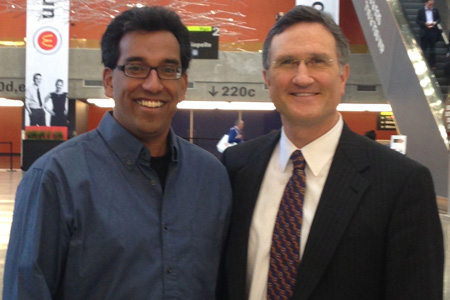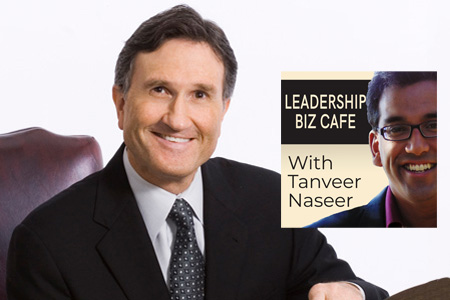How does a storied organization like Disney create an engaged, empowered workforce despite the current economic challenges, and what can other organizations learn from their experience? That’s the basis of my conversation with international keynote speaker and former Disney executive Doug Lipp in this latest episode of “Leadership Biz Cafe”.
Doug began his career at Disney as one of the trainers at the Disney University at Disneyland. This lead to Doug joining the Walt Disney Imagineering team where he not only helped with the creation of Tokyo Disneyland, but also with the creation of the first international version of the Disney University.
Doug then went on to lead the training team at the corporate headquarters of The Walt Disney Company, The Walt Disney Studios.
Following his time at Disney, Doug co-developed with Stanford University professor C. Clarke the Interculture Relations Institute, where he taught diverse teams of professionals how to better navigate the intercultural waters of the global market.
In addition to his work as a keynote speaker and consultant on leadership, culture, and change, Doug is the author of eight books, including his most recent, “Disney U – How Disney University Develops the World’s Most Engaged, Loyal, and Customer-Centric Employees”.
Over the course of our conversation, Doug shared many wonderful stories about Walt Disney and Van France, the founder of the Disney University, as well as some of his many insights from his time at Disney, including:
- What are the “Four Circumstances” or organizational values that have been behind Disney’s continued success and growth, and what they reveal for other organizations as the keys to thriving in today’s challenging environment.
- Why Disney was able to continue to provide training despite increasing costs and declining revenues and how any organization can accomplish the same.
- The one thing that Walt Disney did every day that today’s leaders need to adopt to ensure their organization’s success.
- How Disney overcame their past problems of high employee turnover and disengagement to become one of today’s entertainment juggernauts that continues to evolve and grow.
- What Disney can teach us about creating an environment where employees feel a sense of shared ownership and accountability, ensuring our organization’s continued growth and profitability.
- Why it’s important that we exemplify and apply our cultural values not just within our organization, but also in the actions and efforts we commit to outside our organization’s walls.
As I mentioned at the end of the show, I’d love to hear what you think about this episode, as well as what other topics you’d be interested in hearing more about in upcoming episodes of my show. You can share your thoughts/ideas by leaving a comment below or by filling out the contact form on my website.

I’d appreciate it if you could help support future episodes of this leadership podcast by taking a moment to rate my show on Apple Podcasts, Google Podcasts, or your preferred streaming platform.
Noteworthy links:
- Buy Doug Lipp’s book “Disney U” on Amazon.com (or Amazon.ca for Canadian readers).
- Learn more about Doug’s work and his company at DougLipp.com.


The Disney example is very interesting. I've been interested in the Disney University for a long time. Their retention problem shows that something went off the rails over time. That is, did the leadership lose sight of their goal – the guest vs. making money?
The Disney problem also indicates the need for senior management to always 'walk the walk.' Too often the focus on whatever incentive is being highlighted gets lost over time. If it is education, it MUST be forever if it is going to work.
Hi Marty,
In his book, Doug details how in addition to the fatigue that naturally follows the achievement of a significant goal (in this point, the opening and launch of Walt Disney World in Florida), one key problem was how the Disney management hadn't recognized the changing perspective of their employees. Specifically, how they went from being people who worked there simply for a summer job to doing this work full time.
So the training and support provided wasn't reflective anymore about what it was the Disney employees wanted to contribute or achieve as long-term employees of the organization.
That's why as Doug describes the senior management – and all the heads of the different departments and divisions – got together at the top of Cinderella's castle because they realized this wasn't simply an issue for the Disney U management to address but something that required the full support and dedication of every division and their leader.
And as Doug describes in further detail in his book, it was starting with that attitude and perspective that allowed Disney's leadership to remain invested over the years it took to get their ship back on track and create the foundation that's been behind their success for the last several decades.
So many factors contribute to an organization's culture. Education and training is so key, but has been one area that has been cut out since organizations are so focused on their bottomline. Reminds me of some wisdom a hospitatliy trainer in my industry once shared with. When people ask him, why should I train my people if they are going to leave he would always respond what if you do not train your people and they stay!
Tanveer this is a great show with multiple inspirational points in leadership and humility.
Very impressive. I would love to give this feedback on ITunes, however, when bringing up your podcasts on iTunes, the working was difficult and kept flashing black and white and could not hear other podcasts.
Great downtime in listening to the most recent podcasts via your site.
Thank you for being a great interviewer and great leaders as guest.
Cheers MicheleElys
Hi MicheleElys,
I'm glad you enjoyed this and other episodes of my leadership podcast. I enjoy these conversations with these thought leaders/practitioners so it's always a pleasure to hear my listeners are enjoying it as well.
I'm sorry to hear about your problems posting a review on iTunes. Not sure what could be behind that. If you like, you can post it on page on Stitcher Radio – http://www.stitcher.com/podcast/tanveer-naseer/le…
It seems to be pretty straightforward and can be done from their website.
Thanks again, MicheleElys for the kind words.